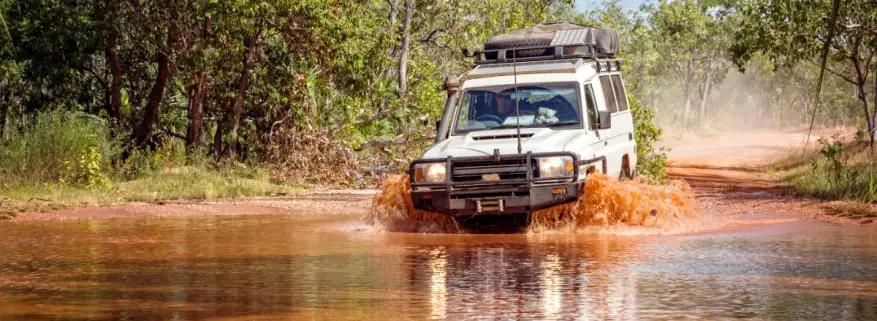What to do in a cyclone while camping

Relocate Your Caravan or Camping Setup
If a mobile caravan is not in the path of the cyclone, it should remain unaffected. To ensure its safety:
- Move the caravan to a safer area if possible. Even relocating 100 km away can make a big difference.
- Relocating is often more effective than spending time and money to secure it in a dangerous area.
- Avoid caravan parks or camps situated in the cyclone’s pathway, especially as many of these are in low-lying areas prone to flooding.
Do not ignore early warnings as this could be your only chance to get to safety.
Relocate Safely
If relocation can be done without unnecessary risk, it is highly recommended to leave the area. Staying behind may place additional strain on emergency services, requiring them to risk their lives unnecessarily. Moving to a safer location ensures vital resources are available for those who truly need assistance.
If sheltering at an evacuation centre, consider offering your help to the volunteers who operate these facilities. Avoid relying passively on others, as everyone benefits from collective effort during such times.
Purchase Supplies Wisely
Stocking up on basic supplies is a good idea, but avoid panic buying. Australia’s supply chains are robust, and stores are typically restocked quickly. Over-purchasing items such as meat or perishables could lead to wastage if power is lost. For most situations, a standard week’s groceries will suffice.
Understand the Cyclone's Impact
Cyclones, characterised by severe low air pressure, can cause ocean water to rise to higher-than-normal levels. This results in tidal surges that can elevate high tides and flood low-lying areas, even those that may not have previously experienced flooding. Be prepared for these additional hazards.
Secure Loose Items
Strong winds can turn unsecured items into dangerous projectiles, posing risks to people, property, and power lines. These objects can also break windows, allowing rain to damage otherwise secure buildings. Ensure all outdoor items are properly secured to avoid unnecessary damage or injury.
Maintain Communication and Power
Ensure all phones, laptops, and other devices are fully charged in case of power outages. Have backup batteries available and monitor weather warnings and emergency updates. Reliable information will help keep you safe.
Stay in touch with family and friends to update them on your situation and check on their wellbeing. Communication can be critical during emergencies.
Avoid driving during and immediately after a cyclone. Flooded streets can be dangerous, and vehicles pushing through water create bow waves that can flood otherwise dry properties. Drive carefully and slowly when necessary to prevent causing additional damage.
Stay Off the Roads
Never attempt to drive through flood waters. These can contain sewage and harmful bacteria, and roads may have been washed away beneath the surface. Modern vehicles may be difficult to escape if submerged, leading to tragic outcomes. Many deaths have occurred due to people ignoring this advice.
Follow Authorities' Instructions
Act on all warnings and adhere to instructions given by authorities. If told to evacuate, do so promptly. Remaining behind endangers not only yourself but also those who may have to rescue you later on.
Be Prepared for Heavy Rain
Following a cyclone, significant rainfall can lead to flooding in low-lying areas. Plan your post-cyclone travel with potential flood risks in mind, and take precautions to avoid unnecessary danger.
21 Mar 2025

